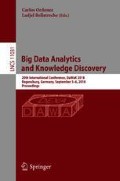Abstract
This study aims to predict the next location of a twitter user only by using his past tweets. Twitter is a very popular micro-blogging platform and a lot of people tweet about different topics varying from personal day-to-day activities to some global event. This provides us with the opportunity to perform sentiment analysis on their past tweets for prediction of their next visit. Sentiment analysis helps in revealing the opinion, desire or intentions of a person looking at the text that they write. In this paper, a new model called Sentiments based Labeled LDA model (SLLDA) is proposed to predict users’ next location within a given geo-spatial range. This kind of prediction can be used by various establishment owners for the targeted promotions of their products. This can also be helpful for personalized recommendation. Various experiments have been performed to evaluate the performance of the proposed model. The proposed model outperforms in every set of experiments and is better than each baseline model considered in the study. The accuracy comparison has also been done for different window lengths of past tweets and different radii of query. The performance of the proposed model turned out to be better for each set of experiments.
Access this chapter
Tax calculation will be finalised at checkout
Purchases are for personal use only
References
Bhattacharya, P., Zafar, M.B., Ganguly, N., Ghosh, S., Gummadi, K.P.: Inferring ser interests in the Twitter social network. In: Kobsa, A., Zhou, M.X., Ester, M., Koren, Y. (eds.) Eighth ACM Conference on Recommender Systems, RecSys 2014, Foster City, Silicon Valley, CA, USA, 06–10 October 2014. ACM (2014)
Bollen, J., Mao, H., Zeng, X.-J.: Twitter mood predicts the stock market. J. Comput. Sci. 2(1), 18 (2011)
Budak, C., Kannan, A., Agrawal, R., Pedersen, J.: Inferring user interests from microblogs. Technical report MSR-TR-2014-68 (2014). http://research.microsoft.com/apps/pubs/default.aspx?id=217311
Li, Q., Zhou, B., Liu, Q.: Can Twitter posts predict stock behavior? a study of stock market with Twitter social emotion. In: 2016 IEEE International Conference on Cloud Computing and Big Data Analysis (ICCCBDA), Chengdu, pp. 359–364 (2016)
Speriosu, M., Sudan, N., Upadhyay, S., Baldridge, J.: Twitter polarity classification with label propagation over lexical links and the follower graph. In: Proceedings of the First Workshop on Unsupervised Learning in NLP (EMNLP 2011), pp. 53–63. Association for Computational Linguistics, Stroudsburg (2011)
Cui, A., Zhang, M., Liu, Y., Ma, S.: Emotion tokens: bridging the gap among multilingual Twitter sentiment analysis. In: Salem, M.V.M., Shaalan, K., Oroumchian, F., Shakery, A., Khelalfa, H. (eds.) AIRS 2011. LNCS, vol. 7097, pp. 238–249. Springer, Heidelberg (2011). https://doi.org/10.1007/978-3-642-25631-8_22
Wang, X., Wei, F., Liu, X., Zhou, M., Zhang, M.: Topic sentiment analysis in Twitter: a graph-based hashtag sentiment classification approach. In: Proceedings of the 20th ACM International Conference on Information and Knowledge Management (CIKM 2011), pp. 1031–1040. ACM, New York (2011)
Baccianella, S., Esuli, A., Sebastiani, F.: Sentiwordnet 3.0: an enhanced lexical resource for sentiment analysis and opinion mining. In: Seventh Conference on International Language Resources and Evaluation, Malta. Retrieved May, Valletta, Malta (2010)
Pennebaker, J.W., Mehl, M.R., Niederhoffer, K.G.: Psychological aspects of natural language use: our words, our selves. Annu. Rev. Psychol. 54(1), 547–577 (2003)
Thelwall, M., Buckley, K., Paltoglou, G.: Sentiment strength detection for the social web. J. Am. Soc. Inf. Sci. Technol. 63(1), 163–173 (2012)
Thelwall, M., Buckley, K., Paltoglou, G., Cai, D., Kappas, A.: entiment strength detection in short informal text. J. Am. Soc. Inf. Sci. Technol. 61(12), 2544–2558 (2010)
Ortega, R., Fonseca, A., Montoyo, A.: SSA-UO: unsupervised Twitter sentiment analysis. In: Proceedings of the 7th International Workshop on Semantic Evaluation - 2nd Joint Conference on Lexical and Computational Semantics (SemEval 2013), pp. 501– 507. Association for Computational Linguistics
Saif, H., He, Y., Fernandez, M., Alani, H.: Contextual semantics for sentiment analysis of Twitter. Inf. Process. Manag. Int. J. 52(1), 5–19 (2016)
Mathew, W., Raposo, R., Martins, B.: Predicting future locations with hidden Markov models. In: Dey, A.K., Chu, H.-H., Hayes, G.R. (eds.) The 2012 ACM Conference on Ubiquitous Computing, Ubicomp 2012, Pittsburgh, PA, USA, 5–8 September 2012, pp. 911–918. ACM (2012)
Bao, J., Zheng, Y., Mokbel, M.F.: Location-based and preference-aware recommendation using sparse geo-social networking data. In: Proceedings of the 20th International Conference on Advances in Geographic Information Systems (SIGSPATIAL 2012), pp. 199–208. ACM, New York (2012)
Yuan, Q., Cong, G., Sun, A.: Graph-based Point-of-interest recommendation with geographical and temporal influences. In: Li, J., Wang, X.S., Garofalakis, M.N., Soboroff, I., Suel, T., Wang, M. (eds.) Proceedings of the 23rd ACM International Conference on Information and Knowledge Management, CIKM 2014, Shanghai, China, 3–7 November 2014, pp 659–668. ACM (2014)
Chauhan, A., Kummamuru, K., Toshniwal, D.: Prediction of places of visit using tweets. Knowl. Inf. Syst. (2016). https://doi.org/10.1007/s10115-016-0936-x
Ramage, D., Hall David, L.W., Nallapati, R., Manning, C.D.: Labeled LDA: a supervised topic model for credit attribution in multi-labeled corpora. In: Proceedings of the 2009 Conference on Empirical Methods in Natural Language Processing, EMNLP 2009, 6–7 August 2009, Singapore, A Meeting of SIGDAT, A Special Interest Group of the ACL, pp. 248–256. ACL (2009)
GoogleAPI (2015) Google Places API. https://developers.google.com/places/documentation
TwAPI (2015) Twitter streaming API. https://dev.twitter.com/docs/using-search
Author information
Authors and Affiliations
Corresponding author
Editor information
Editors and Affiliations
Rights and permissions
Copyright information
© 2018 Springer Nature Switzerland AG
About this paper
Cite this paper
Singh, R., Toshniwal, D. (2018). Location Prediction Using Sentiments of Twitter Users. In: Ordonez, C., Bellatreche, L. (eds) Big Data Analytics and Knowledge Discovery. DaWaK 2018. Lecture Notes in Computer Science(), vol 11031. Springer, Cham. https://doi.org/10.1007/978-3-319-98539-8_8
Download citation
DOI: https://doi.org/10.1007/978-3-319-98539-8_8
Published:
Publisher Name: Springer, Cham
Print ISBN: 978-3-319-98538-1
Online ISBN: 978-3-319-98539-8
eBook Packages: Computer ScienceComputer Science (R0)

